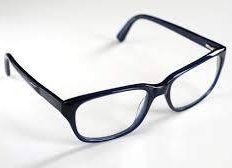Debunking the Myth: Blue Light Glasses

September 30, 2020
You may have read about new specially-crafted glasses referred to as “blue light glasses”. However, if you are not up to date on this “high tech” eyewear, let’s break it down. First off, what exactly is blue light and what do blue light glasses do? According to Medical News Today, “Blue light itself is a short-wave blue light in the spectrum of colors visible to the human eye. Its wavelength is in the blue portion of the electromagnetic spectrum, which is roughly 400–500 nanometers (nm). Computers, laptops, tablets, smartphones, and general lighting can all expose the eyes to blue light. Blue light glasses are glasses that manufacturers claim can filter out blue light. The glasses have filtering materials or surface coatings on the lenses that block a portion of blue light. People who think that their eye and vision symptoms are due to blue light exposure may wear them to decrease their exposure to it.” Now that the basics are covered, time to answer the real question on everyone’s mind. Are these blue light glasses really needed and if so, do they actually protect our eyes from this “dangerous” blue light?
“The short answer is no,” says Shanley Pierce at Texas Medical Center. Pierce claims it is not necessary to spend money on eyewear that has barely been tested by eye doctors. There have been little to no studies that show wearing blue light glasses protect our eyes from screens. In fact, doctors don’t even know enough about the subject to guarantee that blue light glasses are not harmful to eyes. Continuing, from Medical News Today, “Further study is necessary to determine whether or not devices can emit enough blue light to harm the eyes and vision. Long-term studies are necessary to investigate the harmful effects, if any, of chronic daily exposure to screens.” Another article by Health Essentials writes, “And of those studies that have been done, they’ve been too small and it’s not the same thing we’d see in clinical practice.” As one can see, there is a recurring pattern here saying that there is just not enough research to make sure blue light glasses are beneficial in the long run.
So, if blue light isn’t the reason people are getting headaches, fatigue, and poor sleep from screens, what is the cause? The answer provided by most doctors is computer vision syndrome (CVS). Health Essentials shares, “CVS is a broad range of eye strain and discomfort issues. Your eyes are constantly shifting focus and moving while looking at the screen. Plus the glare and contrast can be tough on your eyes. So although you may be experiencing eye irritation from a long day working on your computer, your eye discomfort is not directly from the blue light itself.” Especially with COVID-19, everything is now virtual and some people have to stare at a screen for hours on end. No wonder everyone is complaining about their eyes hurting from their screens; we have never had to look at one for so long! Yet, it is important to educate ourselves on the real problem behind the aches and pains before just jumping on the bandwagon.
Speaking of bandwagons, why is it that so many people are purchasing blue light glasses if the internet literally says don’t buy them? The reasoning is this: the whole concept has become one large trend. The Daily Clog writes, “However, as much as I love glasses for their beneficial properties, the recent nonprescription, blue light glasses trend has made me a little disgruntled. For those of you who don’t get constant ads for blue light glasses, know that you can now purchase $15 glasses that filter out blue light from electronic screens and protect your eyes. Now that wearing glasses is cool, why not try them out, right?” In today’s society, trends practically run the world. So, if one person looks good in the glasses, everyone else is going to want to look good in them too. This became a chain reaction until the glasses were seen everywhere. On a personal level, I, myself, have to admit I hopped on the train for a period of time as well until I decided to do some research and found it was all a scam. But, to be honest, if I hadn’t looked into it, I would still be “using” my glasses every night and taking selfies in them for my friends.
Texas Medical Center provides it’s readers with some tips and tricks to protect their eyes from their screens (for free) and states, “The reality is that most of the problems we’re having with computers and eyestrain isn’t from blue light; it’s from how we use the computers. There are things you can do to minimize eye strain, but as ophthalmologists, we’re not recommending blue blocking glasses.” Some ways found in the article are the following: make sure to blink as often as possible when looking at a screen, lower the brightness of the screen when in a darker setting, sit an arm’s length away from the screen, and use eye drops. Another very recommended technique is practicing the 20-20-20 rule. Health Essentials describes it as, Every 20 minutes look at something 20 feet away for 20 seconds.” All of these tips will actually help because they are proven by doctors to be very beneficial for staring at screens for long periods of time.
In conclusion, this article’s purpose was to indeed debunk the myth “do blue light glasses truly work”. Through countless research various scientists have concluded that there is just not enough out there to really know what blue light is and what it does to the eyes. However, there are many ways to protect your eyes from screens that cost nothing. Please educate yourself on what you are doing to your body and do not just hop on the bandwagon. With social media it is easy to get swept up into the trends, but it is important to remember that barely anything out there is really what it appears to be.
Sources:
https://www.medicalnewstoday.com/articles/do-blue-light-glasses-work#purpose-
https://health.clevelandclinic.org/do-blue-light-blocking-glasses-actually-work/

